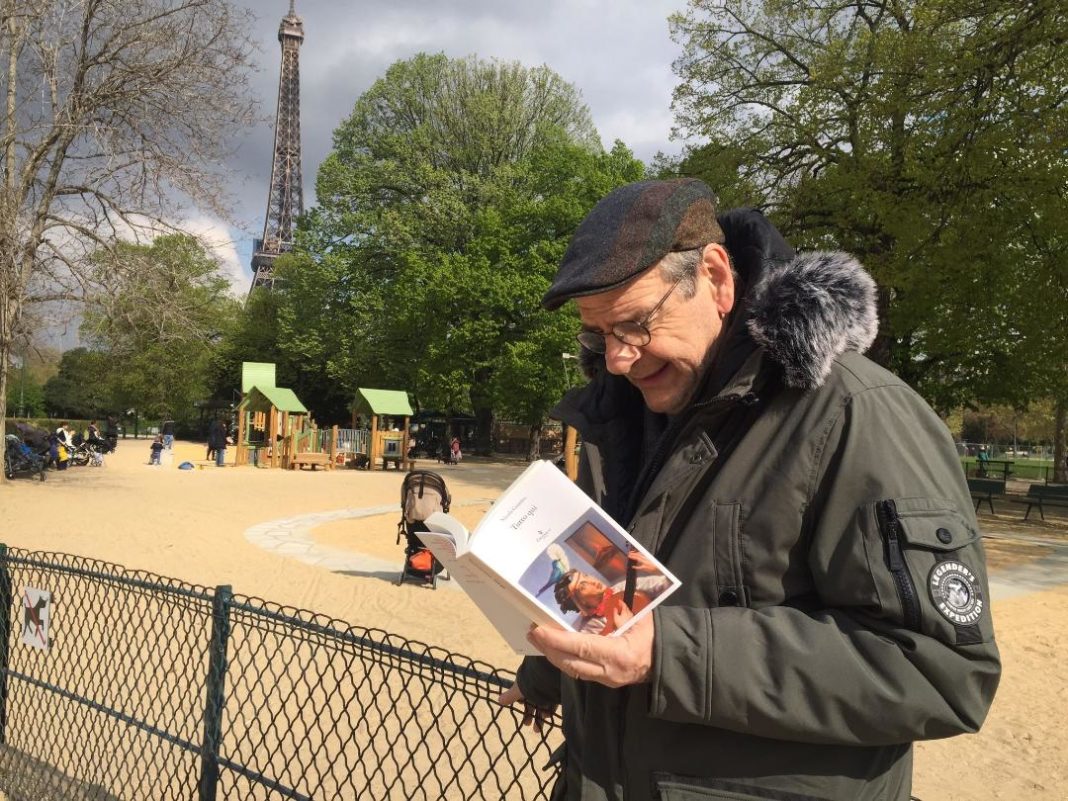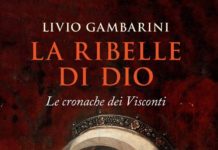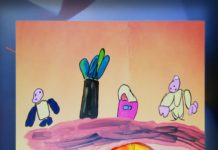Tutto qui. Chi non ha mai utilizzato questa espressione alla fine di un breve discorso, di un dialogo, di una risposta a una domanda? E Tutto qui è anche il titolo di un bel libro di oltre 250 pagine edito dalla casa editrice perugina Graphe.it composto da otto racconti dove la scrittura è attenta, curata elegante, mai artificiosa.
Ne è autore Nicola Guarino, nato ad Avellino alla fine degli anni Cinquanta, di formazione napoletana, appassionato di cinema e avvocato che, a un certo punto della propria vita, si è trasferito nella capitale francese dando una svolta anche alla carriera, da docente. La sua metamorfosi. Oggi insegna lingua italiana all’Università della Sorbona e a Créteil Paris 12.
Inoltre, è uno dei fondatori della testata online Altritaliani.net che offre uno spazio approfondito alla nostra realtà culturale nelle sue infinite sfumature.
Dal 26 aprile il volume, che segna il suo debutto come scrittore, sarà in libreria, proprio a pochi giorni dalla chiusura del festival parigino del libro che ha accolto come ospite d’onore la patria di Dante. Una grande emozione, questa esperienza, che Nicola condivide con ilmondodisuk.
Nicola, dall’amore per il cinema alla cura della parola scritta. Questo libro nasce da un’improvvisa passione o da una lenta evoluzione?
Io credo che le cose della vita quando, come nel mio caso, prendono una certa piega, ti inducono, specie ad una certa età matura, a condividere e a raccontare. Io sono uno studioso di cinema, oltre che essere stato anche un organizzatore di festival, ma non avendo le capacità tecniche per fare cinema, mi sono affidato all’altro strumento che per motivi professionali e passionali ho sempre usato, essendo giornalista ed insegnante universitario, ossia la scrittura. Non a caso, sia nella forma sia nei contenuti, i miei racconti, ma anche il romanzo che è in via di preparazione, hanno molto di cinematografico. Nelle visioni, nel ritmo, nell’uso di indizi e funzioni, come direbbe André Bazin, che consentono una lettura vivace, ricca di colpi di scena e spesso poco prevedibile nel suo svolgersi narrativo.
C’è un’impronta cinematografica nei testi?
Francamente, credo che i racconti in questione, pur avendo una loro dignità narrativa, potrebbero essere in almeno alcuni casi degli ottimi soggetti per delle sceneggiature cinematografiche. La costruzione dei personaggi, lo sviluppo delle trame, spesso, come detto, non prevedibile, favoriscono l’immedesimazione del lettore nei personaggi e nelle vicende. Alcuni, che mi hanno sorretto e seguito in questo lungo lavoro di stesura, mi hanno detto che i racconti sono avvincenti come un film, e che uno dei “meriti” di questi sta proprio nel tenere inchiodato il lettore fino alla fine della storia, come lo spettatore alla poltrona fino allo scorrere dei titoli di coda.
La narrazione si sviluppa tra Napoli e Parigi: prevale il nostro Sud o la Francia?
«Come disse una volta lo scrittore Alessandro Piperno: “Sin dai tempi di Dante Alighieri, si scrive di quello che si conosce”. Aggiungo che anche il racconto più fantasioso del mondo non può prescindere dall’esperienza e del vissuto dell’autore. Napoli e Parigi sono i luoghi del mio vissuto. A Napoli io ho il cuore e sogno un giorno di ritornare lì per sempre. A Parigi c’è la ragione che ha voluto che mi trasferissi per seguire mia moglie che è francese e che di certo avrebbe avuto molte difficoltà a cambiare il suo ottimo lavoro per cercarne uno nella mia città. È difficile dire se prevale il Sud o la Francia, anche perché si tratta di luoghi che devono fare i conti con i sogni e le paure di personaggi che spesso vivono esperienze complesse. Vorrei anche ricordare che vi è un racconto: “L’uomo dei sogni”, che ha un’ambientazione milanese e in quel caso credo che l’ambientazione abbia un ruolo decisivo sulla trama e sui personaggi della storia».
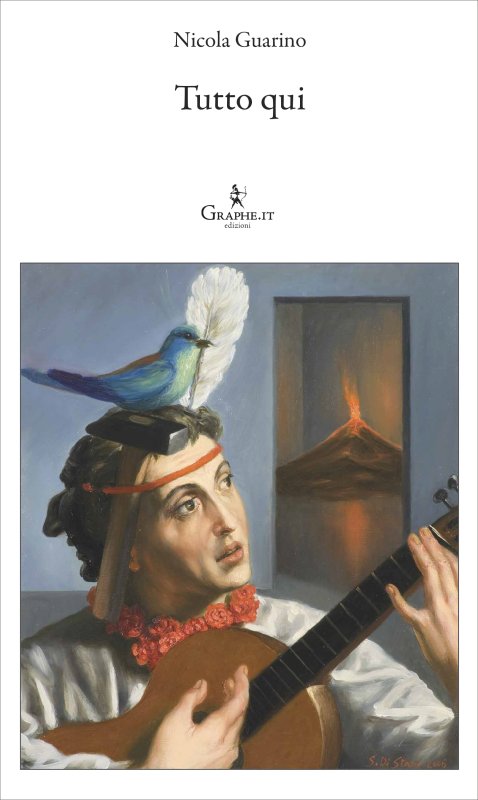
un immagine del golfo partenopeo
Quanto c’è di Nicola Guarino in queste 250 pagine?
«Tantissimo. Come ho ricordato citando Piperno, si racconta sempre bene o male del proprio vissuto. Spesse le mie storie partono da fatti veramente accaduti, da personaggi veri che ho conosciuto, in alcuni casi non ho neanche voluto modificare il nome del personaggio a cui mi ispiravo, poi naturalmente questi fatti e questi personaggi si immergono in un intreccio narrativo che è del tutto frutto di una mia originale creazione. Questa cosa però avviene anche nel cinema: pensi che Ingmar Bergman, a volte, registrava di nascosto le conversazioni degli amici che aveva a cena, utilizzandole poi come dialoghi nei suoi film. In verità, io non sono arrivato a questo. Mi sono limitato all’ispirazione e semmai a pescare qualcosa tra i miei ricordi, le mie felicità, le mie ansie e tristezze».
Un filo rosso che lega le otto storie…
«Il mio editore dice che a leggere i racconti sembra quasi che i personaggi si siano conosciuti, incontrati, forse sfiorati. Già questo è un elemento di contatto ma poi anche i temi che i racconti propongono e che pervadono le varie storie: Le aspirazioni, le ambizioni tradite, la libertà e la felicità, il conflitto tra vita e morte tra un nostro presente sempre più arido e il rimpianto per chi ci ha lasciati e per come eravamo, come nel racconto: Morire, dormire, forse sognare” dove il tema diviene: con chi vogliamo stare con i vivi o con i morti? Cosa che ritroviamo per certi versi anche nel racconto sulla Napoli del Terzo Millennio. Io resto convinto che in realtà, sono tanti i temi di contatto che alla fine si può consigliare di leggere il libro come fosse un romanzo».
Il personaggio che hai più amato…
«Difficile a dirsi. Io li amo tutti, ma volendo scegliere direi la protagonista del racconto più “francese”: La Felicità. Perché Jeanine, che è una ragazza degli anni ’50, si trova nel conflitto tra la sua felicità, i suoi sogni, e gli obblighi, i condizionamenti familiari, le manipolazioni che alla fine ti spingono a scegliere quello che probabilmente non vorresti, questo perché allora, come spesso accade ancora oggi, la vita affettiva ed amorosa delle famiglie è all’insegna dei condizionamenti educativi, dei ricatti morali e allora non è facile, ieri come oggi, scegliere tra un presunto senso morale del dovere e la propria liberta, la propria felicità. Ecco, in questo senso Jeanine con i suoi limiti è forse un’antieroina che primeggia tra i diversi antieroi che popolano le mie storie».
Oggi in Italia si scrive molto, si pubblica troppo e si legge pochissimo. Forse è più facile leggere racconti che un romanzo da seguire senza distrazioni fin dall’inizio?
«Davvero io devo ringraziare il mio editore: Graphe.it di Perugia che ha avuto coraggio nel pubblicare i miei racconti, non perché non fossero validi, ma proprio perché sono racconti. In realtà, come mi è stato spiegato da diversi addetti ai lavori, i racconti (in Italia) hanno pochi lettori, sono preferiti i romanzi. Questo io non me lo spiego, anche perché i racconti hanno una più agile lettura, richiedono forse meno impegno, e tuttavia pare che sia così.
Sul fatto che si scrive molto, questo è vero, aggiungo anche che le grandi case editrici, oggi puntano sul sicuro impegnandosi ben poco nella ricerca di nuovi talenti, per fortuna ci sono ancora editori, il più delle volte piccoli, che fanno lo sforzo di leggersi i manoscritti che vengono inviati e così facendo danno la possibilità ad autori nuovi, come nel mio caso, di farsi conoscere. Infine, si legge poco. È vero. Debbo dire che i francesi leggono molto più degli italiani, ma devo aggiungere che i nostri mezzi di informazione fanno davvero poco per far conoscere i libri. In Francia ogni giorno, nei vari canali radio e televisivi, ci sono programmi, con ospiti, dibattiti e conversazioni che sono dedicati unicamente ai libri. L’informazione aiuterebbe».
E un’ultima informazione la diamo noi: in copertina c’è il dipinto firmato dal napoletano Stefano Di Stasio ( classe 1948) per gentile concessione della galleria Vigato di Alessandria. S’intitola “Suono e visione”: al centro un volto dallo sguardo pensieroso, la chitarra che evoca musica, la fiamma del vulcano… Enigma d’arte e sintesi di questi racconti.
©Riproduzione riservata
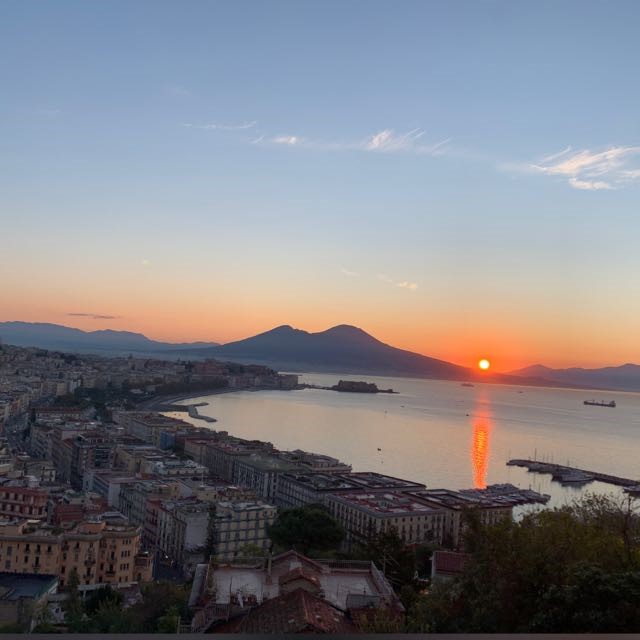
Per saperne di più
Nicola Guarino Scrittore | Facebook
Graphe.it / “That’s all” by Nicola Guarino: debut in narrative writing through 8 short stories. Scenario, Naples and Paris
“That’s all”. Who has never used this expression at the end of a short speech, a dialogue, an answer to a question? And That’s all is also the title of a beautiful book of more than 250 pages published by the by Perugia-based publisher Graphe.it: it’s composed of eight short stories where the writing is careful, elegant, never contrived.
It is written by Nicola Guarino, born in Avellino in 1958, a Neapolitan educated, film enthusiast and lawyer who, at a certain point in his life, moved to the French capital giving a turn to his career, too, as a professor. His metamorphosis. Today he teaches Italian language at Sorbonne University and Créteil Paris 12.
He is also one of the founders of the online journal Altritaliani.net, which offers an in-depth space to our cultural reality in its infinite nuances.
Starting April 26, the volume, which marks his debut as a writer, will be in bookstores, only a few days after the closing of the Paris book festival that welcomed Dante’s homeland as guest of honor. A great excitement, this experience, which he shares with ilmondodisuk.
Nicola, from the love of cinema to the curation of the written word. Was this book born out of a sudden passion or a slow evolution?
I believe that things in life when, as in my case, they take a certain turn, they induce you, especially at a certain mature age, to share and narrate. I am a film scholar, as well as having also been a festival organizer, but not having the technical skills to make films, I relied on the other tool that for professional and passionate reasons I have always used, being a journalist and a university teacher, namely writing. Not surprisingly, both in form and content, my short stories, but also the novel that is in the pipeline, have much that is cinematic. In the visions, in the pacing, in the use of clues and features, as André Bazin would say, that make for a lively reading, full of twists and turns and often unpredictable in its narrative unfolding.
Do the texts have a cinematic imprint?
Frankly, I believe that the stories in question, while having their own narrative dignity, could in at least some cases be excellent subjects for film scripts. The construction of the characters, the plot development, often, as mentioned, unpredictable, encourage the reader’s identification with the characters and the events. Some, who have supported and followed me in this lengthy draft, have told me that the stories are as gripping as a movie, and that one of the “merits” of these lies precisely in keeping the reader nailed to the end of the story, like the viewer to the armchair until the credits roll.
The narrative is developed between Naples and Paris: does our South or France prevail?
As writer Alessandro Piperno once said, “Since the time of Dante Alighieri, one has been writing about what one knows.” I would add that even the most imaginative tale in the world cannot disregard the experience and lived experience of the author. Naples and Paris are the places of my lived experience. In Naples I have my heart and dream of one day returning there forever. In Paris there is the reason that wanted me to move there to follow my wife who is French and would certainly have a lot of difficulty in changing her excellent job to look for one in my city. It is difficult to say whether the South or France prevails, partly because these are places that have to come to terms with the dreams and fears of characters who often go through complex experiences. I would also like to mention that there is a short story, “The Man of Dreams,” which has a Milanese setting, and in that case I think the setting plays a decisive role on the plot and characters in the story.
How much is there of Nicola Guarino in these 250 pages?
A great deal. As I mentioned quoting Piperno, one always tells well or badly about one’s own experience. Often my stories start from facts that really happened, from real characters that I met, in some cases I did not even want to change the name of the character I was inspired by, then of course these facts and characters are immersed in a narrative plot that is entirely my own original creation. However, this thing also happens in cinema: think that Ingmar Bergman sometimes secretly recorded the conversations of friends he had over dinner and then used them as dialogue in his films. In truth, I did not come to that. I limited myself to inspiration and, if anything, to fishing something out of my memories, my happinesses, my anxieties and sadnesses.
A red thread that ties the eight stories together….
My editor says that reading the stories it almost seems as if the characters have known each other, met, perhaps brushed against each other. Already this is an element of contact but then also the themes that the stories propose and that pervade the various stories: Aspirations, ambitions betrayed, freedom and happiness, the conflict between life and death between our increasingly barren present and the regret for those who left us and the way we were, as in the short story: Dying, Sleeping, Perhaps Dreaming” where the theme becomes: with whom do we want to be with the living or the dead? Which we also find in some ways in the story about Naples in the Third Millennium. I remain convinced that actually, there are so many contact themes that in the end you can recommend reading the book as if it were a novel.
The character you loved most…
Hard to say. I love them all, but if I wanted to choose, I would say the protagonist of the most “French” tale: Happiness. Because Jeanine, who is a girl in the 1950s, finds herself in the conflict between her happiness, her dreams, and the obligations, the family conditioning, the manipulations that in the end push you to choose what you probably wouldn’t want, this is because then, as is often still the case today, the emotional and love life of families is under the banner of educational conditioning, of moral blackmail, and then it is not easy, yesterday as today, to choose between a supposed moral sense of duty and one’s own freedom, one’s own happiness. Here, in this sense, Jeanine with her limitations is perhaps an anti-heroine who excels among the various anti-heroes that populate my stories.
Today in Italy we write a lot, publish too much and read very little. Perhaps it is easier to read short stories than a novel to follow without distraction from the beginning?
Really I have to thank my publisher: Graphe.it of Perugia who had the courage to publish my stories, not because they were not good, but precisely because they are short stories. Actually, as it was explained to me by several insiders, short stories (in Italy) have few readers, novels are preferred. This I do not explain, partly because short stories have a more agile readership, they require perhaps less effort, and yet it seems to be so.
On the fact that there is a lot of writing, this is true, I would also add that the big publishing houses, nowadays bet on the safe by committing very little in the search for new talent, fortunately there are still publishers, most of the time small, who make the effort to read the manuscripts that are sent and by doing so give new authors, as in my case, the chance to make themselves known. Finally, very little is read. This is true. I must say that the French read much more than Italians, but I must add that our media do very little to make books known. In France, every day, on the various radio and television channels, there are programs, with guests, debates and conversations that are devoted solely to books. Information would help.
And one last piece of information is given by us: on the cover is the painting signed by the Neapolitan Stefano Di Stasio ( born 1948) courtesy of the Vigato Gallery in Alexandria. It is titled “Sound and Vision”: in the center a face with a thoughtful look, the guitar evoking music, the flame of the volcano… Art enigma and (symbolic) synthesis of these stories.


